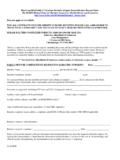Transcription of Forensic Psychological Testing - Steven N. Shape, Ph.D.
1 Steven N. SHAPSE, LICENSED PSYCHOLOGIST SPECIALIZING IN Forensic PSYCHOLOGY AND ASSESSMENT 145 LINCOLN ROAD, BOX 112, LINCOLN, MA 01773 TELEPHONE/FACSIMILE: (781) 259-0283 FAX: E-MAIL: Forensic Psychological ASSESSMENT Introduction Psychological assessment is an invaluable and inestimable tool in the understanding of individual uniqueness. Using in-depth interviews and a comprehensive battery of well researched and stan-dardized tests with highly reliable, valid and reproducible results, a complex, picture of an indi-vidual emerges. A comprehensive assessment helps explain the connection between psychologi-cal functioning and behavior. To be comprehensive, an assessment need examine a range of psy-chological factors. This traditionally includes intellectual and personality functioning that can be further broken down into specific elements: emotional, cognitive, intellectual, developmental, executive, educational, social, organic, neuropsychological, and physiological.
2 The analysis and integration of these elements provides a complex Psychological picture of the individual from which specific behaviors can be understood, diagnoses proffered, recommendations formulated and prognoses proffered. An overall aim of assessment is to provide the basis for inferring ante-cedent and dynamic factors that bear on specific actions, and to make recommendations pertinent to the issues at hand. Benefits of Psychological Assessment Psychological Testing allows the evaluator not only to corroborate interview data and clinical im-pressions, but also to go beyond the interview and collect information of broader Psychological complexity. Information obtained from assessment has a scientific basis as it compares the indi-vidual against normative data.
3 It allows the evaluator to determine how similar or dissimilar this person is to others. While individuals may attempt to look good or look bad in interview de-pending on the case at hand, most test instruments contain validity scales on which to assess whether the individual is providing honest answers and the level of symptom minimization or distortion, if any. The Assessment Assessments are tailored to answer questions posed for the evaluation, making each evaluation unique. An incomplete list of topics for assessment includes: - Cognitive and intellectual abilities - Neuropsychological screening - Personality and executive functioning - Trauma - Violence risk appraisal - Malingering - Psychological competency.
4 Forensic Psychological Assessment Page 2 Typically, an assessment consists of a diagnostic interview, psychosocial history, and a compre-hensive battery of standardized tests to address a subset of the topics just listed. The diagnostic interview, which includes a mental status examination, seeks to understand the individual's cur-rent level of overall functioning. The psychosocial history provides a detailed description of the client's life story covering family of origin, childhood experiences, socialization, marriage, di-vorce, educational, occupational and military (if applicable), history; drug and alcohol involve-ment, past and current medical and Psychological functioning, and past legal difficulties. Inter-view data provides a context in which current issues can be positioned and understood.
5 The Tests The most widely known and commonly utilized tests include: Wechsler Adult Intelligence Scale-III (WAIS-III) The WAIS-III, the most recent of the adult Wechsler tests, published in 1997, is a general test of intelligence, IQ. It has a long history going back to 1921 when David Wechsler developed a new test of intelligence adopting the Army s Alpha and Beta tests. These were developed to screen soldiers during World War-I to evaluate a person s ca-pacity to act purposefully, think rationally, and deal effectively with the environment. Rorschach Ink Blot Test (Exner Method) The Rorschach is an open-structured, performance-based cognitive perceptual problem-solving task. 1 The examinee is presented with the classic inkblots and asked, What might this be?
6 Score results provide an understanding of the individual s basic psycho-logical processes such as impulse control, stress tolerance, reality Testing , imagination, cognitive style, adaptive techniques and interpersonal relationships. Moreover, unlike self-report measures, it is difficult to fake. Despite recent controversies, the Rorschach possesses reliability and validity similar to other generally accepted personality Minnesota Multiphasic Personality Inventory-2 (MMPI-2) The MMPI-2 is an objective personality inventory. It provides findings along multiple dimensions including clinical syndromes, personality patterns, psychosocial stressors and severity of disturbance. It is the most frequently administered and documented of all psy-chological test instruments.
7 It has more than 115 translations and employed world-round. It is self-administered and consists of 567 True/False questions. Scoring provides a num-ber of validity scales, 10 primary clinical scales and a host of content and symptom scales. 1 Gacono, Carl B. and Evans, F. Barton (2008). The Handbook of Forensic Rorschach Assessment. New York:Law-rence Erlbaum Associates, page xi. 2 The Status of the Rorschach in Clinical and Forensic Practice: An Official Statement by The Board of Trustees of the Society for Personality Assessment (2005). Forensic Psychological Assessment Page 3 Final Comment Psychological assessment findings may be utilized for a variety of purposes in family, civil, criminal and clinical matters.
8 Examples include clinical diagnosis, competency to stand trial, bail hearings, sentencing, and the establishment of impaired judgment or diminished capacity. In civil matters, findings assist in custody determinations, allegations of sexual abuse, and in the estab-lishment of trauma or other psychic injury. Additional References Kaufman, Alan S. and Lichtenberger, Elizabeth O. (2006). Assessing Adolescent and Adult Intel-ligence, (3rd Edition.) New York:John Wiley & Sons, Inc. Pope, Kenneth S, Butcher, James N. et al (2006). The MMPI, MMPI-2, and MMPI-A In Court: A Practical Guide for Expert Witnesses and Attorneys (3rd Edition). Wash., : American Psy-chological Association. Steven N.
9 Shapse, All rights reserved except quoted material.







